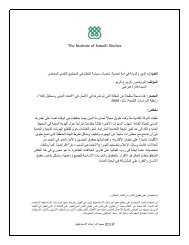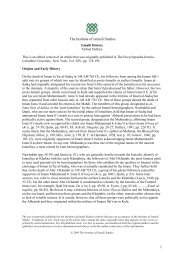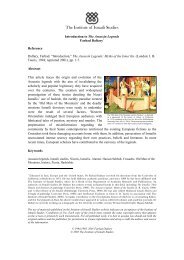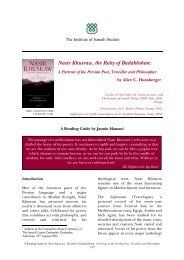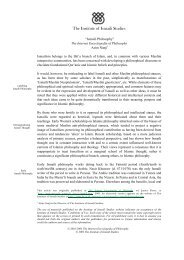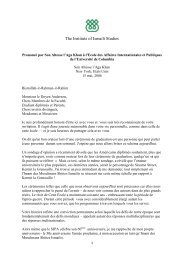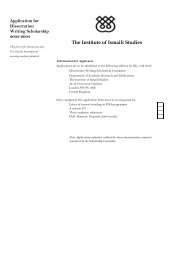Convocation Address at the University of Toronto - The Institute of ...
Convocation Address at the University of Toronto - The Institute of ...
Convocation Address at the University of Toronto - The Institute of ...
You also want an ePaper? Increase the reach of your titles
YUMPU automatically turns print PDFs into web optimized ePapers that Google loves.
<strong>The</strong> <strong>Institute</strong> <strong>of</strong> Ismaili Studies<br />
<strong>Convoc<strong>at</strong>ion</strong> <strong>Address</strong> to Gradu<strong>at</strong>es <strong>of</strong> <strong>the</strong> Ontario <strong>Institute</strong> for Studies in Educ<strong>at</strong>ion<br />
His Highness <strong>the</strong> Aga Khan<br />
June 18, 2004<br />
<strong>University</strong> <strong>of</strong> <strong>Toronto</strong><br />
<strong>Toronto</strong>, Ontario, Canada<br />
Chancellor Poy,<br />
President Birgeneau,<br />
Dean Gaskell,<br />
Members <strong>of</strong> <strong>the</strong> Governing Council,<br />
Faculty,<br />
Parents and Students<br />
Fellow Gradu<strong>at</strong>es:<br />
I thank you for your warm welcome, and am deeply moved by <strong>the</strong> honour th<strong>at</strong> this renowned<br />
institution <strong>of</strong> learning has done <strong>of</strong> conferring upon me <strong>the</strong> degree <strong>of</strong> Doctor <strong>of</strong> Laws, honoris<br />
causa. I accept this award with much happiness, but also a pr<strong>of</strong>ound sense <strong>of</strong> humility,<br />
cognisant th<strong>at</strong> many men and women, <strong>of</strong> higher distinction and more notable achievements,<br />
are also being recognised, joining an illustrious line <strong>of</strong> previous recipients.<br />
But, above all, today’s event belongs to you, <strong>the</strong> graduands <strong>of</strong> OISE, as you contempl<strong>at</strong>e <strong>the</strong><br />
n<strong>at</strong>ure <strong>of</strong> <strong>the</strong> world which awaits your engagement. From your choice <strong>of</strong> educ<strong>at</strong>ion as <strong>the</strong> area<br />
<strong>of</strong> knowledge <strong>of</strong> gre<strong>at</strong>est interest to you, <strong>the</strong>re are, <strong>at</strong> least, three questions which I assume<br />
you will apply to most <strong>of</strong> your future endeavours. First, wh<strong>at</strong> will future gener<strong>at</strong>ions <strong>of</strong><br />
educ<strong>at</strong>ed people in Canada and around <strong>the</strong> world need to know to earn for <strong>the</strong>mselves, and<br />
<strong>the</strong>ir families, honourable livelihoods? Secondly, wh<strong>at</strong> will future gener<strong>at</strong>ions need to know<br />
to make our world a better place? And third, wh<strong>at</strong> can you, as Canadians, do to play an<br />
optimised world role?<br />
In 1957, <strong>the</strong> year I became imam <strong>of</strong> <strong>the</strong> Shia Ismaili Muslims, <strong>the</strong> Nobel Peace Prize winner<br />
was a 60 year-old st<strong>at</strong>esman who, two years earlier, in a book entitled Democracy in World<br />
Politics, had written:<br />
We are now emerging into an age when different civilis<strong>at</strong>ions will have to learn<br />
to live side by side in peaceful interchange, learning from each o<strong>the</strong>r, studying<br />
each o<strong>the</strong>r's history and ideals, art and culture, mutually enriching each o<strong>the</strong>r’s<br />
lives. <strong>The</strong> only altern<strong>at</strong>ive in this overcrowded little world, is misunderstanding,<br />
tension, clash, and c<strong>at</strong>astrophe.<br />
<strong>The</strong> prescient writer, whom some <strong>of</strong> you will recognise as a distinguished alumnus and<br />
former teacher <strong>at</strong> this gre<strong>at</strong> institution, went on to lead this country as its fourteenth Prime<br />
Minister: Lester B. Pearson.<br />
<strong>The</strong> use <strong>of</strong> m<strong>at</strong>erials published on <strong>the</strong> <strong>Institute</strong> <strong>of</strong> Ismaili Studies website indic<strong>at</strong>es an acceptance <strong>of</strong> <strong>the</strong> <strong>Institute</strong> <strong>of</strong><br />
Ismaili Studies’ Conditions <strong>of</strong> Use. Each copy <strong>of</strong> <strong>the</strong> article must contain <strong>the</strong> same copyright notice th<strong>at</strong> appears<br />
on <strong>the</strong> screen or printed by each transmission. For all published work, it is best to assume you should ask both <strong>the</strong><br />
original authors and <strong>the</strong> publishers for permission to (re)use inform<strong>at</strong>ion and always credit <strong>the</strong> authors and source<br />
<strong>of</strong> <strong>the</strong> inform<strong>at</strong>ion.<br />
© 2004 <strong>The</strong> <strong>Institute</strong> <strong>of</strong> Ismaili Studies
Four weeks ago, speaking <strong>at</strong> <strong>the</strong> ‘Leadership and Diversity Conference’ in Ottawa, I noted<br />
th<strong>at</strong> some 40% <strong>of</strong> <strong>the</strong> countries in <strong>the</strong> United N<strong>at</strong>ions are failed democracies, and <strong>the</strong> UN’s<br />
own experience pointing to <strong>the</strong> general weak st<strong>at</strong>e <strong>of</strong> civil society in <strong>the</strong>se countries as one <strong>of</strong><br />
<strong>the</strong> major causes for this widespread failure. Wh<strong>at</strong> is civil society? Why is it so essential to<br />
<strong>the</strong> good health <strong>of</strong> any modern st<strong>at</strong>e? And wh<strong>at</strong> is <strong>the</strong> role <strong>of</strong> educ<strong>at</strong>ion in shaping and<br />
enriching civil society?<br />
<strong>The</strong> World Bank uses <strong>the</strong> term to refer to a wide array <strong>of</strong> organis<strong>at</strong>ions th<strong>at</strong> have a presence in<br />
public life but are not affili<strong>at</strong>ed to <strong>the</strong> st<strong>at</strong>e. <strong>The</strong>y function on a not-for-pr<strong>of</strong>it basis to express<br />
<strong>the</strong> interests and values <strong>of</strong> <strong>the</strong>ir members and o<strong>the</strong>rs, based on ethical, cultural, political,<br />
scientific, religious or philanthropic consider<strong>at</strong>ions. In this sense, civil society organis<strong>at</strong>ions<br />
are multifarious: from community and indigenous groups through faith-based and charitable<br />
organis<strong>at</strong>ions, to non-governmental organis<strong>at</strong>ions (NGOs), labour unions, pr<strong>of</strong>essional<br />
associ<strong>at</strong>ions and found<strong>at</strong>ions.<br />
But <strong>the</strong>re is a broader definition th<strong>at</strong> holds th<strong>at</strong> civil society embraces an even wider diversity<br />
<strong>of</strong> spaces, actors and institutional forms th<strong>at</strong> vary in <strong>the</strong>ir degree <strong>of</strong> formality, autonomy and<br />
power. Besides <strong>the</strong> Bank’s c<strong>at</strong>egories, <strong>the</strong>se spaces are popul<strong>at</strong>ed by such organis<strong>at</strong>ions as<br />
village and women’s groups, neighbourhood self-help groups, social movements, business<br />
associ<strong>at</strong>ions, microcredit organis<strong>at</strong>ions, coalitions and advocacy groups.<br />
In an era <strong>of</strong> rising expect<strong>at</strong>ions and unmet needs, both in <strong>the</strong> developed, but much more in <strong>the</strong><br />
developing world, civil society institutions play an essential role in <strong>the</strong> provision <strong>of</strong> social<br />
services, <strong>the</strong> protection <strong>of</strong> <strong>the</strong> marginalised and <strong>the</strong> delivery <strong>of</strong> development programmes. <strong>The</strong><br />
positive action <strong>of</strong> <strong>the</strong>se civil society initi<strong>at</strong>ives is especially critical where governments are<br />
weak or non-performing, as in situ<strong>at</strong>ions <strong>of</strong> failed democracies or post-conflict reconcili<strong>at</strong>ion<br />
and reconstruction.<br />
Wh<strong>at</strong>ever definition is used, a quality civil society is independent <strong>of</strong> government, pluralist and<br />
led by merit-based educ<strong>at</strong>ed leadership. Not only does Canadian civil society eminently meet<br />
<strong>the</strong>se three criteria <strong>of</strong> being non-governmental, pluralist and merit-led, I know <strong>of</strong> no country<br />
where civil society is more emp<strong>at</strong>hetic with <strong>the</strong> needs <strong>of</strong> civil society <strong>of</strong> <strong>the</strong> countries <strong>of</strong><br />
Africa and Asia in which I have been working for some 45 years. I have, <strong>the</strong>refore, asked<br />
myself, not once, but hundreds <strong>of</strong> times, if and how Canadian civil society can mobilise its<br />
resources more vigorously to help improve <strong>the</strong> quality <strong>of</strong> life <strong>of</strong> <strong>the</strong> peoples <strong>of</strong> Africa and<br />
Asia.<br />
Asked in <strong>the</strong>se terms, <strong>the</strong> issue is th<strong>at</strong> <strong>of</strong> sharing <strong>the</strong> many forms <strong>of</strong> human knowledge and<br />
experience th<strong>at</strong> cre<strong>at</strong>e and <strong>the</strong>n sustain a civil society <strong>of</strong> quality, r<strong>at</strong>her than <strong>the</strong> massive<br />
injection <strong>of</strong> monetary resources. <strong>The</strong>re are, however, two obvious pre-conditions: First, th<strong>at</strong><br />
<strong>the</strong> governments and peoples <strong>of</strong> <strong>the</strong> developing world wish for, and welcome, <strong>the</strong> help being<br />
<strong>of</strong>fered. This requires an enabling social, legal and fiscal environment. Secondly, th<strong>at</strong><br />
Canadian institutions and human resources must see in <strong>the</strong>ir willingness to help, real<br />
enrichment in life’s purpose.<br />
Assuming <strong>the</strong>se preconditions are met, you may ask how this wide civil society partnership<br />
for development can occur in practice. <strong>The</strong>re are innumerable forms which have achieved<br />
genuine successes in <strong>the</strong> past. <strong>The</strong>se include: <strong>the</strong> sharing <strong>of</strong> best practices, <strong>the</strong> twinning <strong>of</strong><br />
institutions, quality improvement in delivery <strong>of</strong> healthcare and educ<strong>at</strong>ion, secondment <strong>of</strong><br />
leadership such as school head teachers or university pr<strong>of</strong>essors in specialised fields,<br />
…Please see copyright restrictions on page 1 2
streng<strong>the</strong>ning civil society institutions in forward programming and performance<br />
measurement, continuing educ<strong>at</strong>ion for <strong>the</strong> most marginalised pr<strong>of</strong>essions such as nursing or<br />
journalism, teaching best practice in <strong>the</strong> not-for-pr<strong>of</strong>it and charity field. <strong>The</strong> opportunities for<br />
partnership are many. But <strong>the</strong>y are not being realised, or if <strong>the</strong>y are, it is <strong>at</strong> a level infinitely<br />
below <strong>the</strong> needs, and dram<strong>at</strong>ically below <strong>the</strong> potential for change.<br />
This is <strong>the</strong> n<strong>at</strong>ure <strong>of</strong> <strong>the</strong> true regime change we need, where <strong>the</strong> civil society <strong>of</strong> <strong>the</strong><br />
industrialised world gives wide and encompassing support to th<strong>at</strong> <strong>of</strong> <strong>the</strong> developing world.<br />
True regime change occurs when liberty is guaranteed by a people free to cre<strong>at</strong>e or support<br />
institutions <strong>of</strong> <strong>the</strong>ir own choosing. True regime change occurs when th<strong>at</strong> strength and th<strong>at</strong><br />
freedom are defined by <strong>the</strong> depth, breadth and quality <strong>of</strong> educ<strong>at</strong>ion shared across <strong>the</strong> society<br />
in question.<br />
Partnerships between <strong>the</strong> developed and developing worlds can and do work. Moreover, <strong>the</strong>y<br />
demonstr<strong>at</strong>e how essential universities and <strong>the</strong>ir lifeblood – you <strong>the</strong>ir gradu<strong>at</strong>es – are to civil<br />
society.<br />
Today, in Pakistan, <strong>the</strong> Kyrgyz Republic and Tanzania, <strong>at</strong> <strong>the</strong> forefront <strong>of</strong> curricular change<br />
and new teaching technologies, are young men and women who, like yourselves, have studied<br />
<strong>at</strong> OISE. <strong>The</strong>y are gradu<strong>at</strong>es <strong>of</strong> <strong>the</strong> Aga Khan <strong>University</strong>’s <strong>Institute</strong> for Educ<strong>at</strong>ional<br />
Development, which was established with <strong>the</strong> help <strong>of</strong> <strong>the</strong> Universities <strong>of</strong> <strong>Toronto</strong> and Oxford.<br />
Today, also, <strong>the</strong> Aga Khan <strong>University</strong> is collabor<strong>at</strong>ing with intern<strong>at</strong>ional research institutions<br />
in <strong>the</strong> developed world in areas ranging from cancer and HIV/AIDS to cardiovascular disease,<br />
perin<strong>at</strong>al infection and hypertension. <strong>The</strong>se collabor<strong>at</strong>ions, across n<strong>at</strong>ional, cultural, linguistic,<br />
religious and ethnic boundaries are serving to find ways <strong>of</strong> preserving life.<br />
At <strong>the</strong> nascent <strong>University</strong> <strong>of</strong> Central Asia, we are researching and addressing <strong>the</strong> challenges<br />
<strong>of</strong> mountain societies, drawing on a multiplicity <strong>of</strong> traditions to cre<strong>at</strong>e stability and prosperity<br />
in remote yet geopolitically sensitive regions <strong>of</strong> <strong>the</strong> world – preserving not just life, but<br />
societies, cultures and, perhaps, n<strong>at</strong>ions.<br />
Today, you are gradu<strong>at</strong>ing from one <strong>of</strong> Canada’s gre<strong>at</strong>est universities in a field <strong>of</strong> study th<strong>at</strong> is<br />
<strong>of</strong> paramount importance. I am speaking to you as a person whose roots and institutional<br />
engagement are in <strong>the</strong> developing world; as a Muslim; as someone seeking to engage with,<br />
and improve, <strong>the</strong> lives <strong>of</strong> <strong>the</strong> millions <strong>of</strong> people who live in Asia and Africa.<br />
It is against this background th<strong>at</strong> I invite you – indeed, I urge you – to reflect deeply on <strong>the</strong><br />
needs <strong>of</strong> our world today. I am sure you will wish to seize <strong>the</strong> opportunities for sharing your<br />
knowledge with future gener<strong>at</strong>ions here in Canada, but should you wish it, <strong>the</strong> reach <strong>of</strong> your<br />
knowledge can go far beyond your shores, and will be deeply welcomed. Because civil<br />
society is so critical to <strong>the</strong> quality <strong>of</strong> life, and <strong>the</strong> pace <strong>of</strong> progress, and because it finds<br />
expression in so many pluralist forms and spaces, I am convinced th<strong>at</strong> <strong>the</strong> future before you,<br />
in this global environment we share, <strong>of</strong>fers you a remarkable spectrum <strong>of</strong> opportunities.<br />
Thank you.<br />
…Please see copyright restrictions on page 1 3



